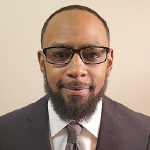- Patient Capital in Action: An Interview with Cambridge Savings Bank’s Yvonne Kizner and Cal Navatto
- The Growing Impact of Supply Chain Finance: Insights from SFNet's 2025 Market Sizing Study
- Secured Finance at Scale: Why the SFNet 2025 Market Sizing Study Matters More Than Ever
- Tiger Group Launches Investment Banking Division Led by Special Situations Veteran Jamie Lisac
- 2025 Ends on a High Note for Syndicated ABL: Strong Finish Despite Uneven Trends
Interview with Antonio McKinney, Member of SFNet’s Diversity, Equity & Inclusiveness Committee
By Michele Ocejo

Antonio McKinney is a business intelligence analyst with over 10 years of professional sales, workforce management and factoring experience. Antonio is an HBCU alumni, hailing from Langston University with a bachelor’s degree in Business Management. He currently works for TBS Factoring, LLC as the embedded analyst for the accounting division. Antonio resides in Oklahoma where he enjoys spending time with his wife and their 8-month-old daughter.
Please provide a bit of background, including how you got into the industry and your current role.
I began my career as a sales representative for the third largest food and beverage company in North America. In this role I exceeded projected sales goals and decreased territory losses. I eventually moved on to an assistant management role with a large grocery retailer. During my tenure in this position my store became the top grossing store in the division. Although my experience with grocery retail was positive, and one where I was able to build upon my management and sales abilities, I wanted a change. I eventually found the right fit with TBS Factoring, LLC. At that time, I was new to the trucking industry and had little knowledge of factoring. Despite my inexperience, I focused my efforts on learning the industry and worked my way up the ladder from an account executive to my current position as a business intelligence analyst.
In my current role, I use data to make meaningful recommendations to drive our company efforts forward. As the embedded analyst for the accounting division, I create process improvement through the development of meaningful and actionable data analysis and dashboard reporting.
Why did you join the Committee?
Throughout my career, and the multifaceted positions and industries I have been a part of, one thing has been consistent: the lack of minority supervisors or leaders. For me, graduating from a historically black university fostered a spirit of pride, excellence and mentorship. This Committee is my opportunity to assist in developing a process to implement influential changes to the culture of this industry. It also provides me the opportunity to be the leader I failed to see during my own experiences in the workforce. If I can be a voice, a mentor, a sounding board or even assist with the development of someone else’s vision, then I am accomplishing my personal and professional goals for myself and my company.
What do you think the industry can do to increase diversity, equity and inclusiveness?
The industry can become more visible and accessible to the minority talent pool. That means fostering relationships within communities and educational institutions where diversity is reveled and presented as a positive, not a negative. The industry can work to make diversity a priority and a part of a company’s culture, instead of a reaction to world events. Companies should work harder to get to know their employees so that they can individualize their company’s diversity activities, as race and sexual orientation are not a monolith, but rather an added bonus to the individuals that add value to their brand. Companies can further seek to bring in organizations to assist with culture transitions, D&I activities, and create an overall inclusive atmosphere for everyone. Diversity is more than just race. It has to do with developing a community at work where everyone can be their best self and where everyone feels safe, secure and respected, because in that atmosphere the very best work for the company and the industry can be accomplished. And that is really our goal.



.jpg?sfvrsn=f1093d2a_0)
